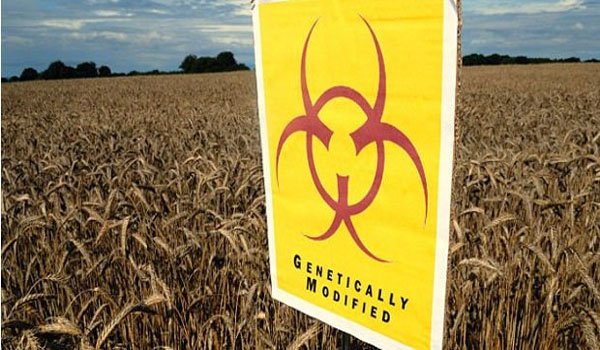A virus gene that could be poisonous to humans has been missed when GM food crops have been assessed for safety. GM crops such as corn and soya, which are being grown around the world for both human and farm animal consumption, include the gene.
A new study by the EU’s official food watchdog, the European Food Safety Authority(EFSA), has revealed that the international approval process for GM crops failed to identify the gene.

As a result, watchdogs have not investigated its impact on human health and the plants themselves when assessing whether they were safe.
The findings are particularly powerful because the work was carried out by independent experts, rather than GM critics.
It was led by Nancy Podevin, who was employed by EFSA, and Patrick du Jardin, of the Plant Biology Unit at the University of Liege in Belgium.
They discovered that 54 of the 86 GM plants approved for commercial growing and food in the US, including corn and soya, contain the viral gene, which is known as ‘Gene VI’.
In this country, these crops are typically fed to farm animals producing meat, milk and eggs.
Significantly, the EFSA researchers concluded that the presence of segments of Gene VI ‘might result in unintended phenotypic changes’.
Such changes include the creation of proteins that are toxic to humans. They could also trigger changes in the plants themselves, making them more vulnerable to pests.
Critics say the revelations make clear that the GM approvals process, which has been in place for 20 years, is fatally flawed.
They argue the only correct response is to recall all of the crops and food products involved. Director of the campaigning group, GM Freeze, Pete Riley, said the discovery of the gene, ‘totally undermines claims that GM technology is safe, precise and predictable’.
He said: ‘This is a clear warning the GM is not sufficiently understood to be considered safe. ‘Authorisation for these crops must be suspended immediately, and they should be withdrawn from sale, until a full and extended review of their safety has been carried out.’
Typically, GM crops are modified in the laboratory to give them resistance to being sprayed with powerful weed killers such as Monsanto’s Round-up.
This means that, in theory, fields can be doused with the chemical, so wiping out the weeds and allowing the food plants to thrive.
 It was previously assumed that virus genes are not present in plants once they are grown in the field and reachconsumers, however it is now clear that this is not the case
It was previously assumed that virus genes are not present in plants once they are grown in the field and reachconsumers, however it is now clear that this is not the caseThe modification process involves inserting genes into the plants using a technique that allows them to piggyback on viruses that are commonly found in the soil and plants.
It has been assumed that virus genes are not present in the plant once it is grown in the field and reachesconsumers, however it is now clear that this is not the case.
A review of the EFSA research in Independent Science News said the presence of the viral gene appears to have been missed by biotech companies, universities and government regulators.
‘This situation represents a complete and catastrophic system failure,’ it said. ‘There are clear indications that this viral gene might not be safe for human consumption. It also may disturb the normal functioning of crops, including their natural pest resistance.
‘A reasonable concern is that the protein produced by Gene VI might be a human toxin. This is a question that can only be answered by future experiments.’
Biotech supporters argue that there is no evidence from countries such as the USA that eating GM food causes any harm.
However, the reality is that no health monitoring has taken place to establish this. The findings will embarrass the government and the food and farming Secretary, Owen Patterson, who has embarked on a pro-GM propaganda exercise designed to win over sceptical consumers.
Mr Patterson recently rejected public concerns as ‘humbug’ and ‘complete nonsense’. Policy director at the Soil Association, Peter Melchett said: ‘For years, GM companies have made a deliberate and chilling effort to stop independent scientists from looking at their products.
‘This is what happens when there is a complete absence of independent scrutiny of their GM crops.’ Biotech firms are represented by the Agricultural Biotechnology Council(ABC).
Its chairman, Dr Julian Little, said the EFSA study was one small part of a strict and complex scrutiny process.
He said: ‘Over the past 25 years, the European Commission has funded more than 130 research projects involving 500 independent research groups which have found no higher risks to the environment or food chain from GM crops than from conventional plants and organisms.
‘Furthermore, nearly three trillion meals containing GM ingredients have been eaten without a single substantiated case of ill-health. The combination of these two facts can give consumers a huge amount of confidence in the safety of GM crops.’
'Medical science information ' 카테고리의 다른 글
| How to Protect Yourself From Chemtrail Poisoning (0) | 2013.01.26 |
|---|---|
| Chemicals banned in Europe still make their way into US foods (0) | 2013.01.24 |
| Israeli Election: Time to bin Left and Right Terminologies (0) | 2013.01.23 |
| “Mainstream” Doctors and Nurses Often Use Alternative Medicine for Themselve (0) | 2013.01.23 |
| GMO Scandal: The Long Term Effects of Genetically Modified Food on Humans (0) | 2013.01.23 |